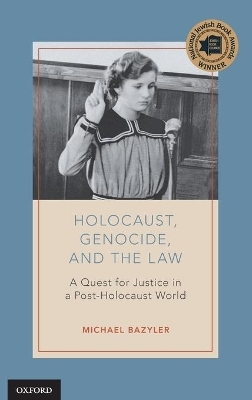
Holocaust, Genocide, and the Law
Oxford University Press Inc (Verlag)
978-0-19-539569-3 (ISBN)
Michael Bazyler is Professor of Law and The 1939 Society Scholar in Holocaust and Human Rights Studies at the Fowler School of Law, Chapman University. He is the author of Holocaust Justice: The Battle for Restitution in America's Courts (2003), Holocaust Restitution: Perspective on the Litigation and its Legacy (co-authored with Roger Alford, 2006), Forgotten Trials of the Holocaust (co-authored with Frank Tuerkheimer, 2014), and numerous articles on international human rights law. He has testified before Congress and his writings have been cited by the United States Supreme Court.
Introduction
PART I: THE LEGAL HISTORY OF THE HOLOCAUST AND GENOCIDE
Chapter 1 The Holocaust: A Legal History
A. Nazi Germany as a Law-Based State
B. The Nazis Come to Power Through Law
C. Legal Measures Against Jews in the Reich
D. War, Occupation and Ghettoization in Occupied Europe
E. Extermination: The Legal Holocaust
F. Aftermath
Chapter 2 Naming the Crime: Genocide
A. The Historical Background of the Term Genocide
B. The Genocide Convention
1. Legislative History
2. Definition of Genocide
3. Actus Reus of Genocide - The Prohibited Acts
4. Mens Rea of Genocide: With Intent to Destroy, In Whole or in Part
5. Genocide-Related Crimes: Conspiracy, Incitement, Attempt and Complicity
6. Proving Genocide
7. Punishment
C. Use and Misuse of Genocide Terminology
1. Using and Misusing the G-word: Why Words Matter
2. When Is It Proper to Characterize A Historical Event as a Genocide?
Part II: Legal Reckoning with the Crimes of THE HOLOCAUST
Chapter 3 Prosecution of Nazi War Criminals at Nuremberg
A. The International Military Tribunal at Nuremberg
1. The Rocky Road at Nuremberg
2. The Trial
3. Major Criticisms of the IMT
4. The Holocaust at Nuremberg
B. The Later Nuremberg Proceedings
1. The Twelve NMT Trials
2. Noel, Noel, what the hell
3. Legacy of the NMT
Chapter 4 National Prosecutions of Nazi War Criminals
A. Prosecutions in Germany
1. The Ulm Einsatzgruppen Trial
2. The Frankfurt Auschwitz Trial
B. The Trial of Adolf Eichmann in Israel
1. Eichmann Before Jerusalem - The Nazi Era
Eichmann's Escape and Capture
2. Eichmann in Jerusalem -The Trial
3. Legacies of Trial
C. Hunting for Nazis in America
D. Retrospective
Chapter 5 Civil Litigation for the Financial Crimes of the Holocaust
A. Stealing From the Jews
B. Returning What Was Stolen
1. Restitution by the Allies in Occupied Germany
2. German Reparations to Israel and Survivors
3. Holocaust Restitution in the 1990's - A Measure of Justice Fifty Years Later
4. Holocaust Restitution in the 21st Century: The French Railroad Settlement
C. Why Didn't the Holocaust Restitution Model Work for Other Historical Atrocities?
1. Herero Genocide Litigation
2. Litigation Against Japanese Industry Arising Out of the Second World War
3. South African Apartheid Litigation
4. African-American Reparations Litigation
5. Armenian Genocide Era Litigation
6. Shutting the Door on Universal Jurisdiction: The 2013 Kiobel Supreme Court Decision
Chapter 6 Holocaust Denial and the Law
A. What is Holocaust Denial?
B. Criminalizing Speech: Holocaust and Genocide Denial Laws in Europe
C. Should Holocaust Denial Be a Crime?
D. The Future of Denial Laws
Chapter 7 The Impact of the Holocaust on Post-Holocaust Legal Philosophy
A. Carl Schmitt and the State of Exception
B. Karl Loewenstein and Germany's Militant Democracy
C. Gustav Radbruch and the Hart-Fuller Debate: What is "Law"?
D. The State of Exception After 9/11
Part III: The Holocaust As A Catalyst For MODERN International Criminal Justice
Chapter 8 Nuremberg's Legacy: The UN Tribunals for Yugoslavia and Rwanda and the International Criminal Court
A. Building a Better Nuremberg
B. Creating the Case Law of Genocide
1. Joint Criminal Enterprise and Genocide
2. Public Incitement to Commit Genocide
3. Command Responsibility and Genocide
C. Criticisms of the ICTs Slow start
D. Nuremberg and the International Criminal Court
Chapter 9 Prosecuting Genocide International Prosecutions
1.ICTR Prosecutions
2.ICTY Prosecutions
3.ICC Prosecutions
B. Domestic Prosecutions
1.Nikola Jorgi?: The First Person Convicted of Genocide?
2.Rwandan Genocidaires
Conclusion: Can Genocide Be Prevented?
Index
| Erscheinungsdatum | 29.11.2016 |
|---|---|
| Verlagsort | New York |
| Sprache | englisch |
| Maße | 236 x 152 mm |
| Gewicht | 703 g |
| Themenwelt | Geschichte ► Teilgebiete der Geschichte ► Militärgeschichte |
| Recht / Steuern ► EU / Internationales Recht | |
| Recht / Steuern ► Öffentliches Recht ► Völkerrecht | |
| Recht / Steuern ► Rechtsgeschichte | |
| Recht / Steuern ► Strafrecht | |
| ISBN-10 | 0-19-539569-7 / 0195395697 |
| ISBN-13 | 978-0-19-539569-3 / 9780195395693 |
| Zustand | Neuware |
| Haben Sie eine Frage zum Produkt? |
aus dem Bereich


